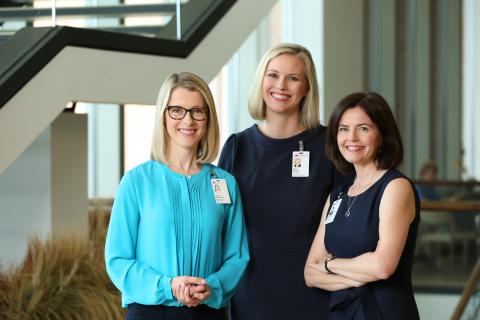The Clinical and Translational Science Institute (CTSI) offers comprehensive services and support for planning, implementing, conducting, and analyzing studies. CTSI provides this kind of clinical research support to investigators as well as for entire departments, as it does for the University of Minnesota’s Department of Dermatology.
“It’s important that we closely link our department to the expertise of a CTSI research professional.”
The department’s contract with CTSI gives them ongoing access to a dedicated clinical research professional who’s knowledgeable in clinical research regulations and institutional research requirements, providing guidance on navigating the often complex research system and processes. The CTSI research professional's role is to advise, educate, and collaborate with department investigators developing investigator-initiated clinical research projects, and facilitate the start-up and execution of business and industry studies in partnership with the research teams.
Such an arrangement with CTSI enables departments such as dermatology to consistently access research expertise, support their junior investigators during all steps of a study, and enable its investigators to focus on the research itself, rather than navigating the process. Ultimately, this positions University of Minnesota departments to more efficiently and effectively secure funding and advance their discoveries.
“It’s important that we closely link our department to the expertise of a CTSI research professional,” says Maria Hordinsky, MD, Professor and Chair of the Department of Dermatology. “That way, we have someone who knows our faculty members’ studies, and brings extensive administrative skills and clinical research knowledge back to our department.”
The dedicated CTSI research professional assists the department with protocol development, gathering information to develop grant budgets, IRB submissions, study logistics, and other clinical study aspects.
The department also turns to CTSI for other areas of research support, such as biostatistical expertise and guidance on regulatory affairs and recruitment strategies.
Enlisting CTSI for ongoing support
The department began contracting CTSI support after one of the department’s key clinical research nurses retired. The University had just received a $51 million grant from the Clinical and Translational Science Awards (CTSA) Program, the University’s largest ever National Institutes of Health grant at the time. CTSI uses this award in conjunction with University support to build a research infrastructure that enhances the way studies are conducted at the University, and effectively supports junior as well as more senior investigators.
“It became clear that if we shifted away from a department-centric research infrastructure to a team approach that engaged CTSI, we could do a better job initiating, executing, and closing out studies,” says Dr. Hordinsky.
Take the regulatory affairs of a study. While few research professionals have the know-how, or the time to navigate the many regulatory requirements, CTSI has clinical research staff who keep up with research regulations and best practices related to devices, drugs, the needs of participants, and more. So Dr. Hordinsky made sure this expertise would be available to researchers throughout the department, noting:
“It’s challenging for us to know all the many rules and regulations because they change so frequently. We rely on CTSI staff to assist with our regulatory work upfront, and help us stay on top of the ever-changing regulatory environment.”
Taking a team approach

For industry-sponsored or grant-supported research projects, the department follows a relatively straightforward process. The dedicated CTSI research professional facilitates the study from start-up to close-out, and the clinical research coordinator implements the study by assisting with participant recruitment, screening study participants, collecting data, and participating in clinic and monitor visits with investigators. All activities are under the supervision of the PI, who is also typically evaluating studies, conducting safety tests, and reviewing the data that comes through, such as blood test results.
“Engaging CTSI to provide ongoing support for our department’s studies works very well, as long as we can keep costs at a reasonable level,” says Dr. Hordinsky
If a department study is industry-sponsored or supported through grants, it includes a line item that covers research staff, space, and lab work provided by CTSI.
Supporting junior investigators
While up-and-coming investigators have ideas for research studies, they often lack the knowledge required to convert that into a protocol and move the project closer to funding. That’s where CTSI steps in.
CTSI provides resources, such as guidance for junior faculty and recruitment consultations, at no cost to the department, like it does for other University researchers. This is made possible by funding from the University, as well as the CTSA grant.
“CTSI helps our junior investigators advance their research ideas by helping with protocol development, providing guidance, and staying on top of the various duties along the way,” says Kristen Hook, MD, an Assistant Professor who leads the department’s pediatric dermatology program and is a junior faculty member herself. “The goal is to help researchers who are early in their careers gain experience, and receive support that enables them to move more studies forward, more effectively.”
For example, one of the department’s 2+2 research fellows had an idea and, with the help of CTSI, developed a study protocol and NIH grant proposal that got a very close-to-fundable score on the first round. Now, the team’s focused on addressing reviewer critique and preparing for a resubmission.
“This kind of progress is exciting, and I don’t think we could have pulled it off without the additional expertise, proposal review, and regulatory knowledge from CTSI,” says Dr. Hordinsky. “By moving studies forward in a coordinated, professional way, CTSI is helping facilitate the success of our department’s rising stars in research.”
Combining expertise
One way the Department of Dermatology is nurturing the next wave of research projects is through regular meetings that unite the department’s researchers and their dedicated CTSI research professional. During that time, they review all studies, not just the studies that CTSI is working on.
This linkage creates a broad knowledge base and a dynamic environment that can help get budding studies off the ground, while also easing a future transition, should the study grow and become managed by CTSI.
“If a junior faculty member has a research idea, I encourage them to share it at our meetings, so we can receive CTSI’s guidance about how to get the study up and running, and position it to clear hurdles along the way,” says Dr. Hook. “My process is to have everyone in our program involve CTSI because it makes things run more efficiently, and has been a huge benefit for our young faculty.”
Providing comprehensive support
One critical way CTSI is supporting Dr. Hook’s pediatric dermatology program is by helping with the multi-site studies they participate in through a national Pediatric Dermatology Research Alliance (PedRA). Dr. Hook turns to CTSI to help understand the nuances between research sites and their distinct IRBs, and draft regulatory documents that can be submitted by institutions across the country.

The department also allocates funding toward ongoing biostatistical support, so its faculty members can engage CTSI’s biostatisticians when they need to. Statisticians provide statistical and data management support, from study design to final analysis to publishing results.
Enlisting CTSI for ongoing support also creates a seamless way for the department to tap into CTSI resources available at no cost to all University researchers, such as for recruiting clinical research participants. The Department of Dermatology combines their own strategy and resources with the support and additional databases that CTSI offers. A coordinated, collaborative approach helps the department overcome common barriers to research, as Dr. Hordinsky explains:
“A lot of the areas that traditionally hold up studies – such as recruiting patients and handling regulatory affairs – now are running more smoothly."
Moving research forward
The blend of CTSI support – via a dedicated point person, biostatisticians, regulatory experts, recruitment consultants, study coordinators assigned to specific studies, and other research staff – is benefiting the department.
“Having ongoing support from CTSI has helped us become more effective researchers, and to develop studies more productively,” says Dr. Hook. “We spend less time navigating complex regulatory bureaucracies and more time focused on the research itself, which enables us to expand our volume of studies.”
Moving forward, the department will continue collaborating with CTSI to streamline and enhance the research process, so its investigators can advance their research and ultimately make discoveries that can help patients with common and rare dermatologic diseases.
Individuals and departments interested in using CTSI’s services are encouraged to contact CTSI at [email protected] or 612-625-CTSI (2874).
